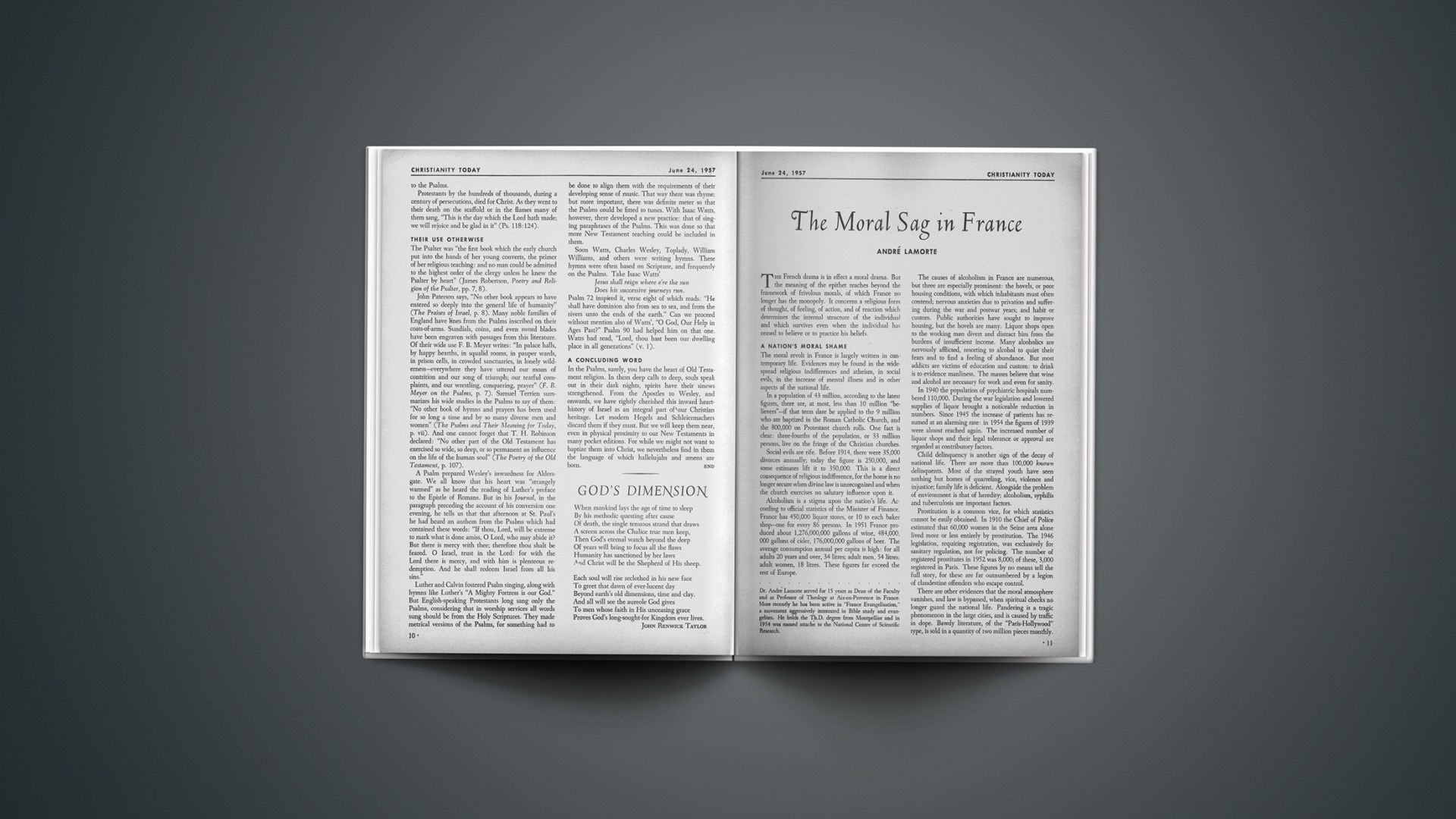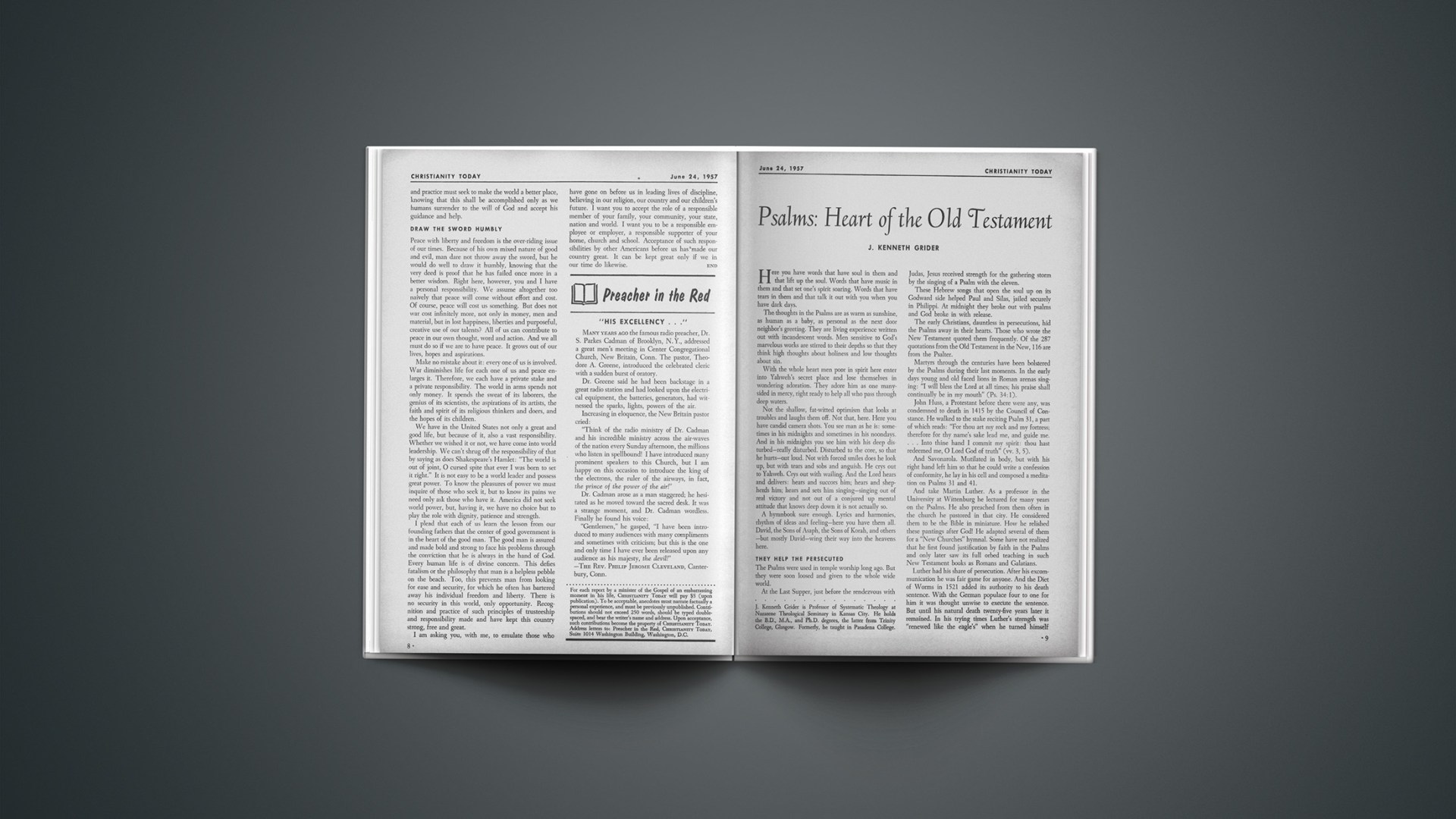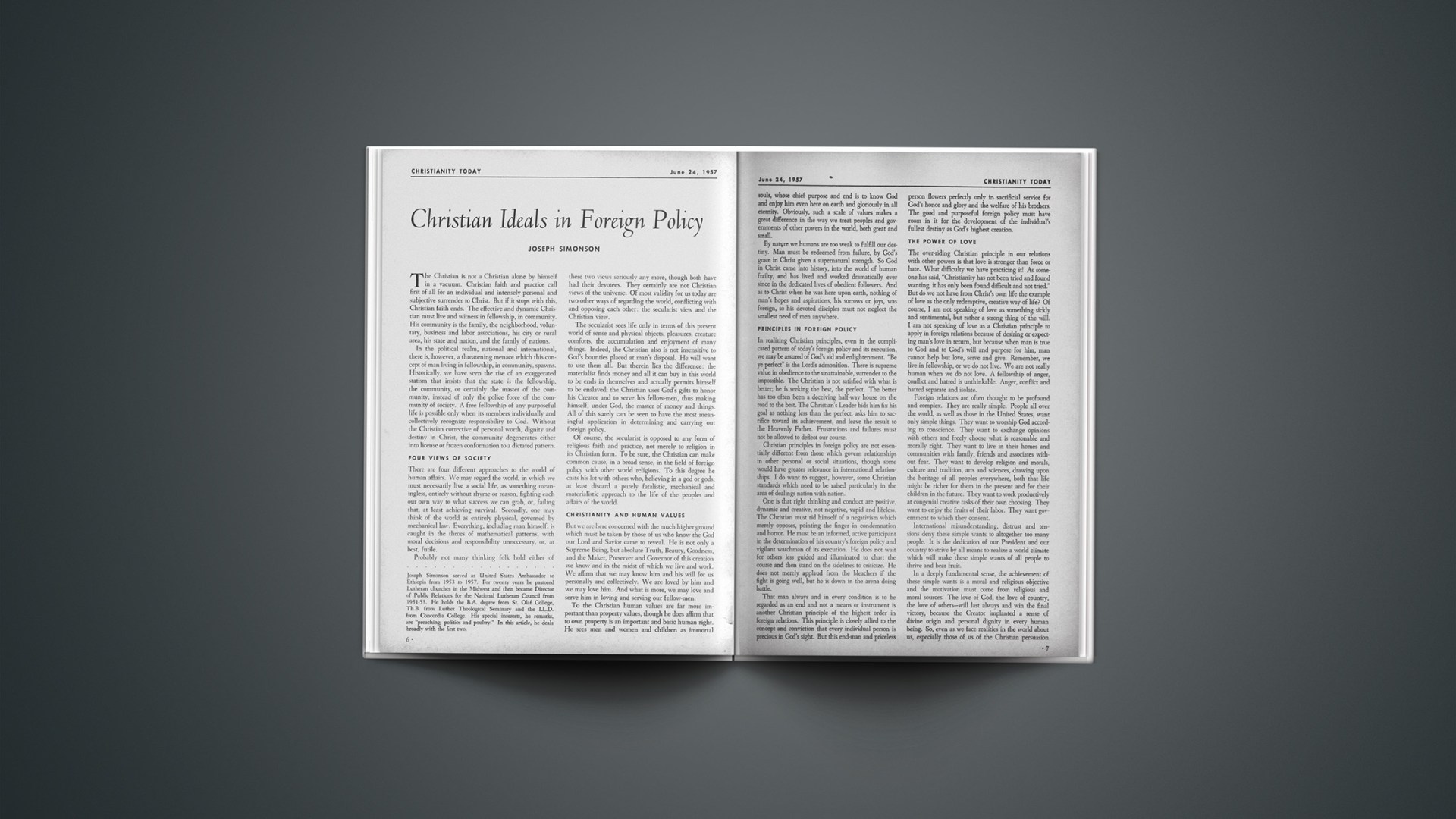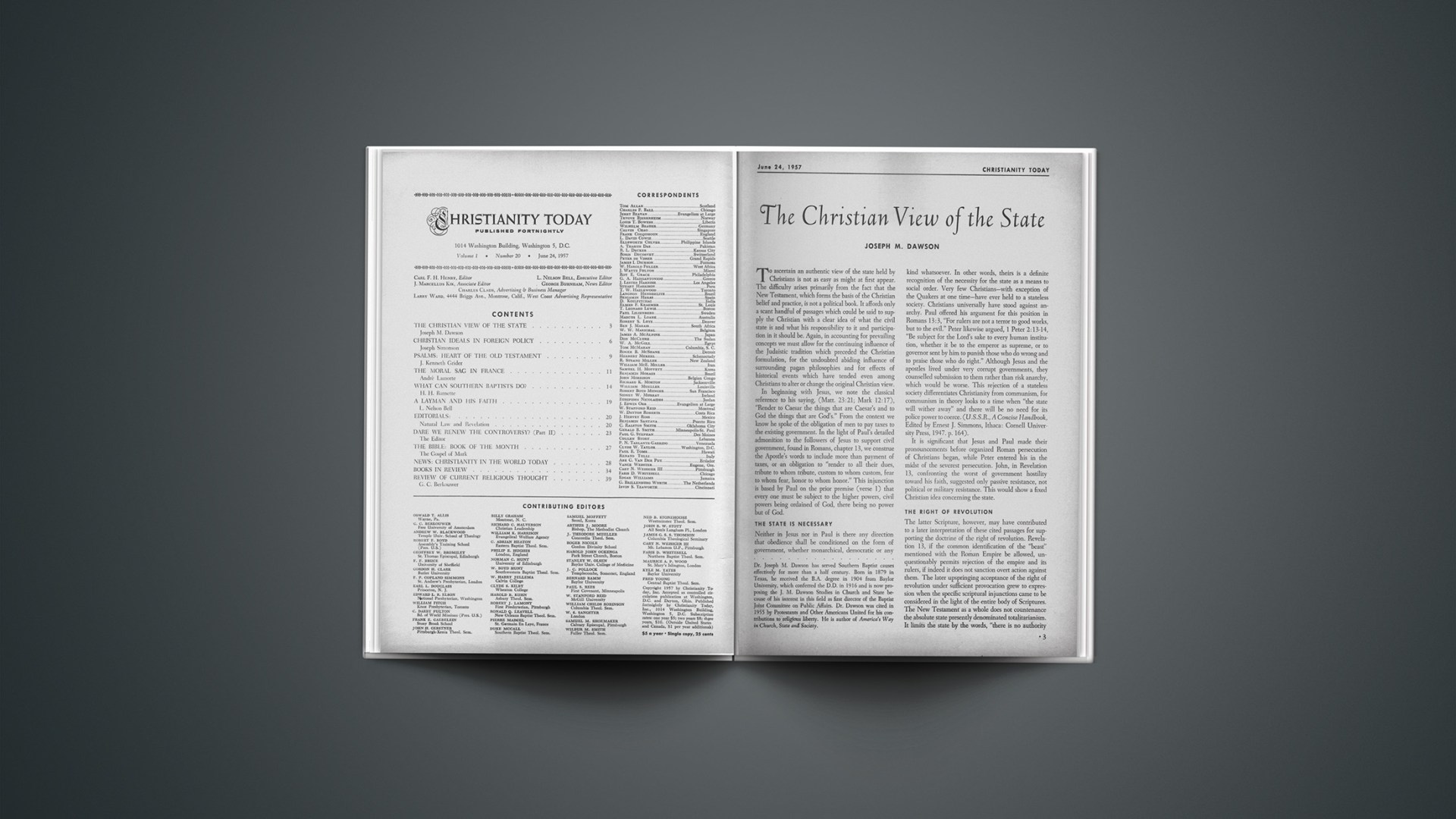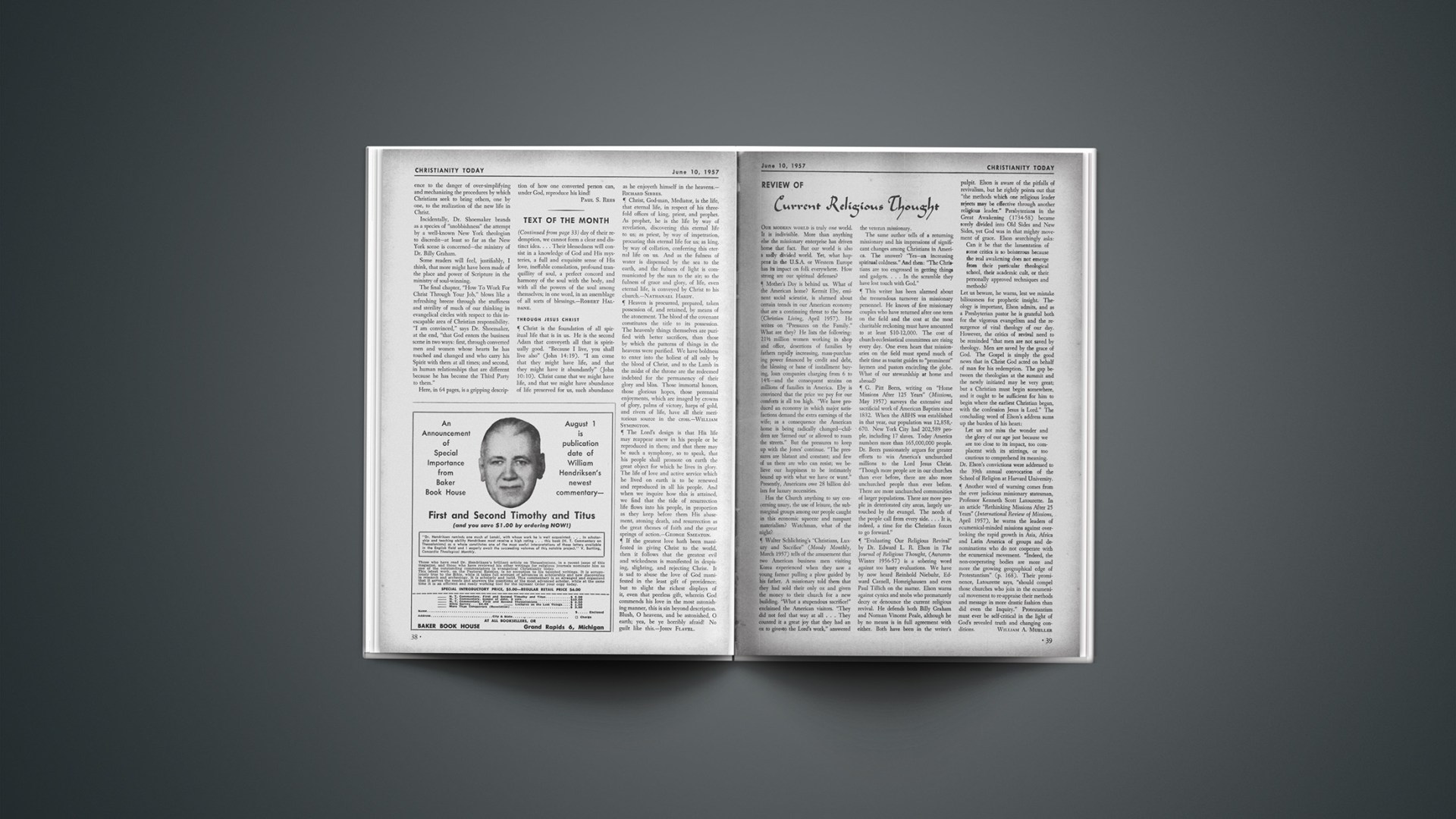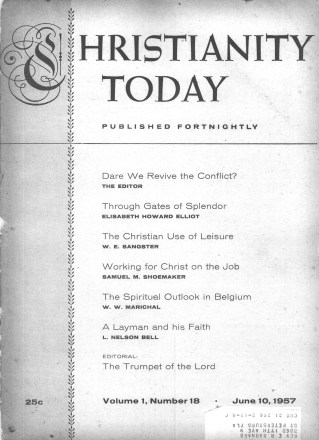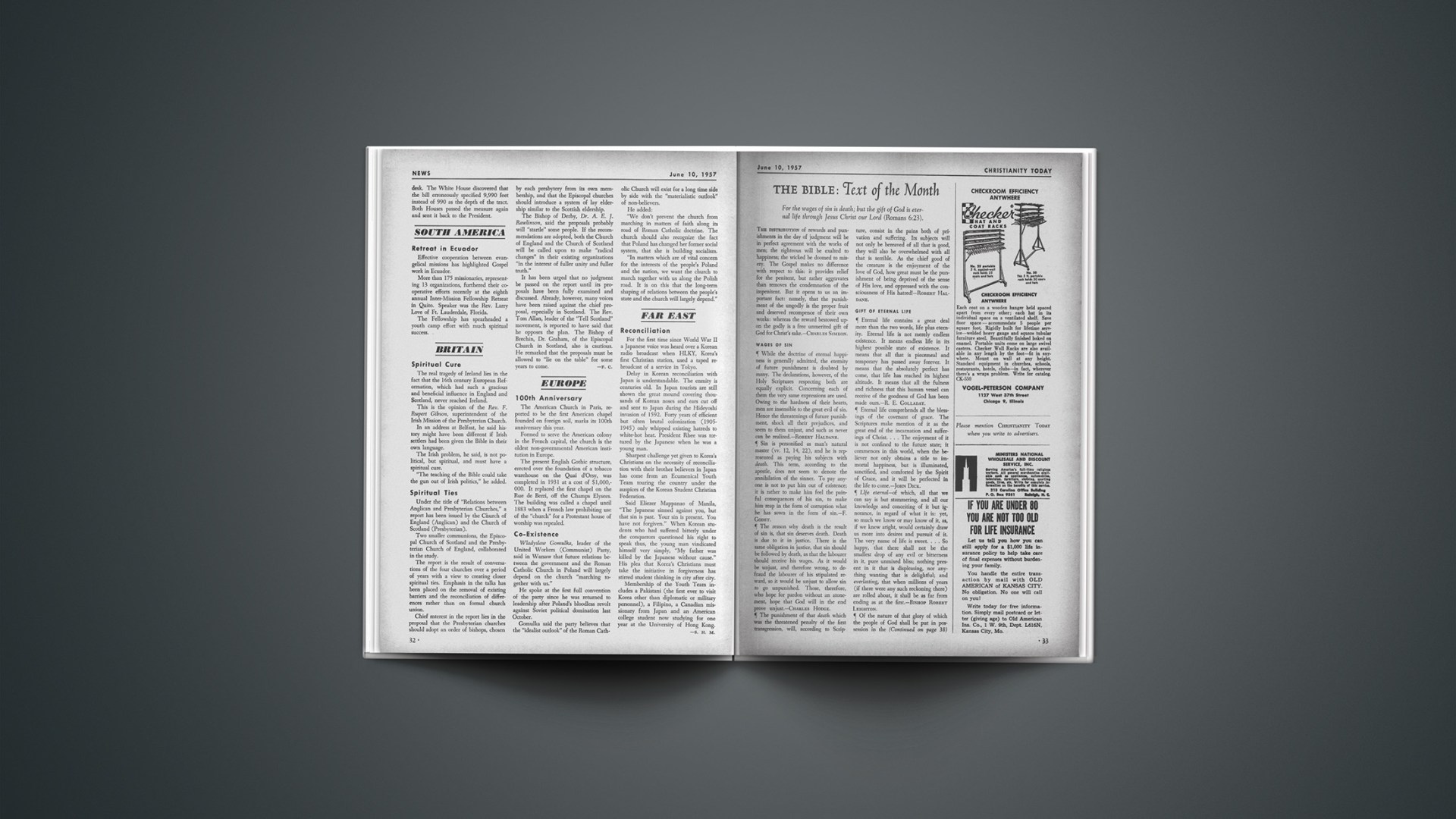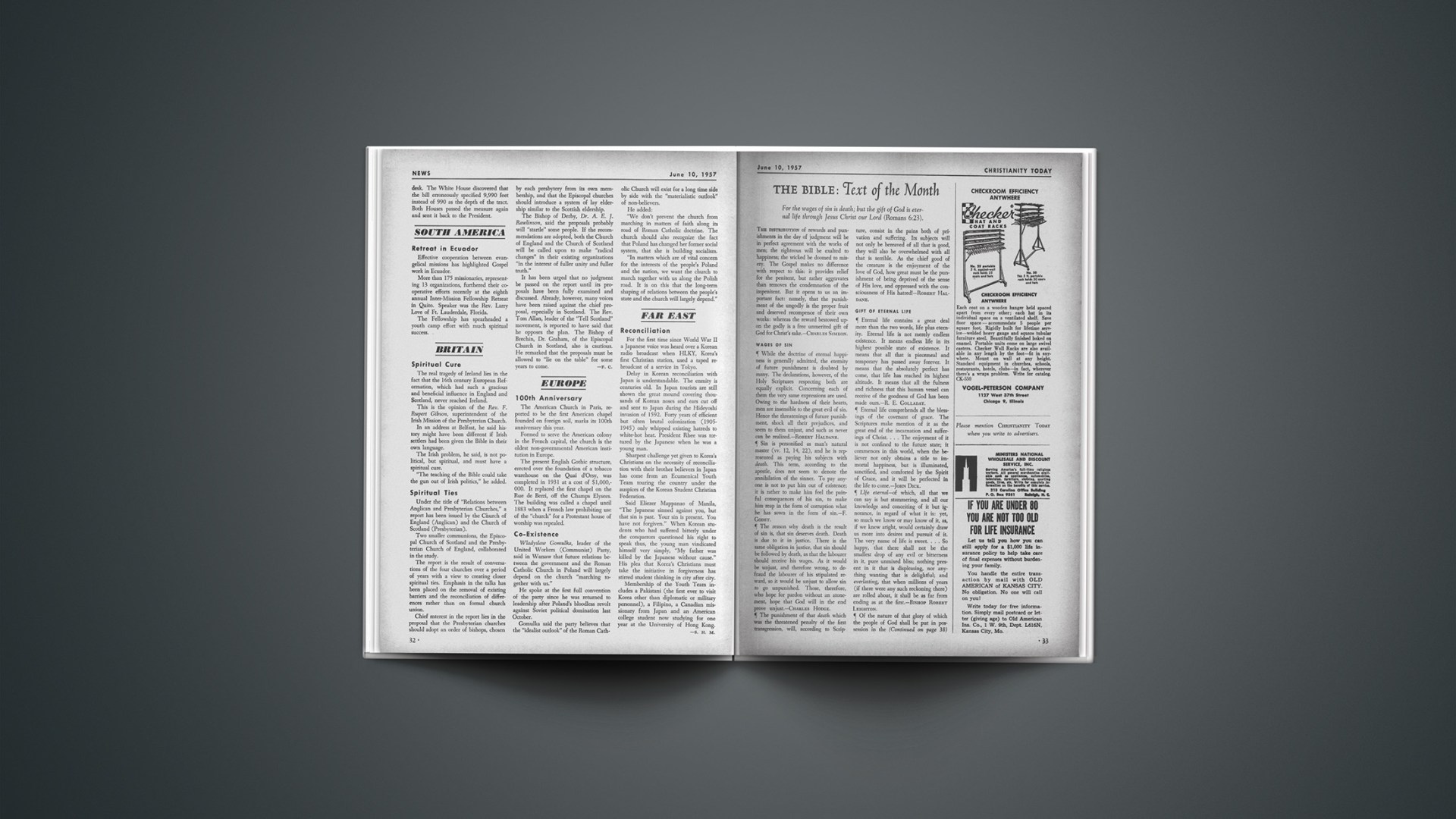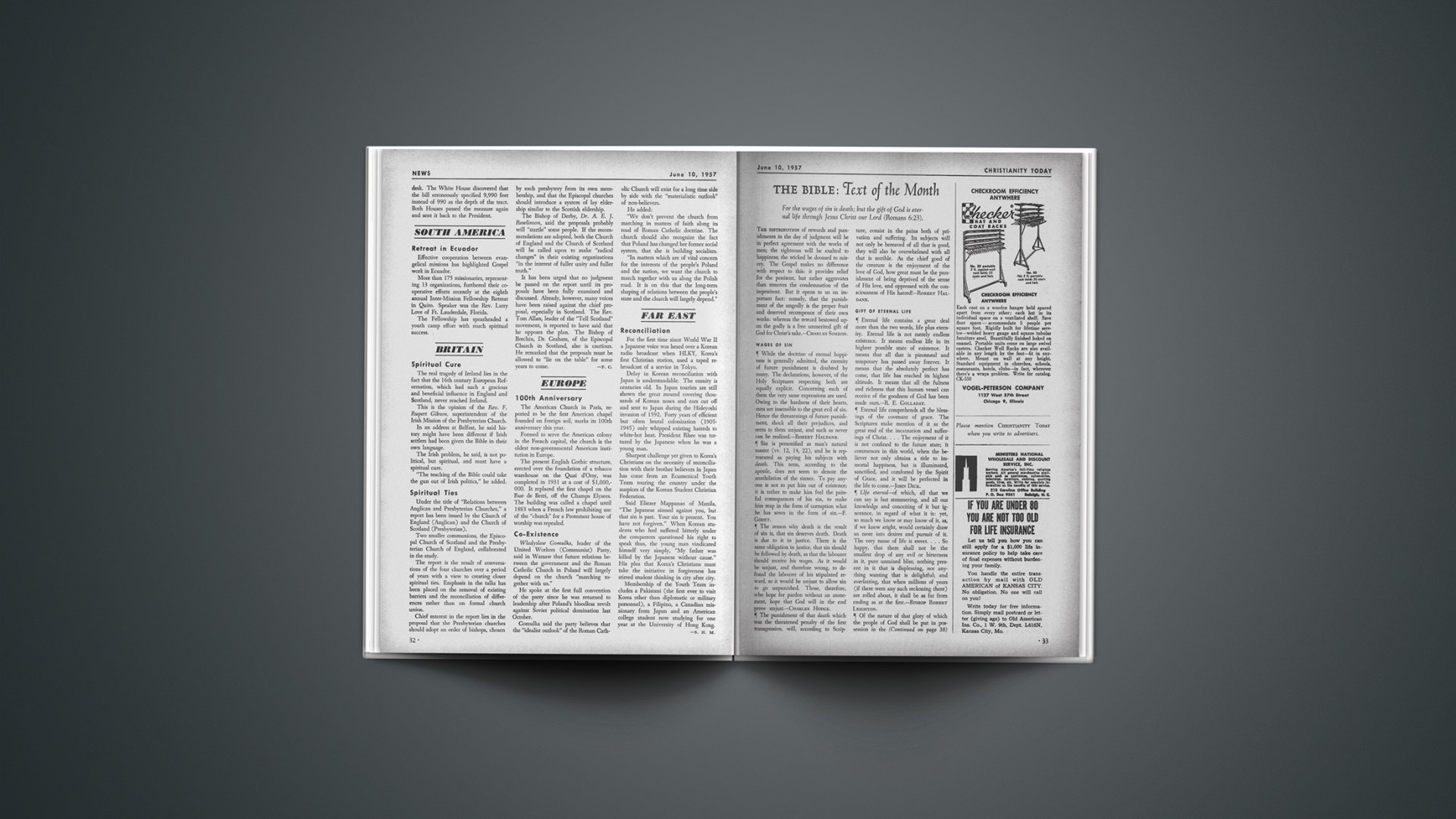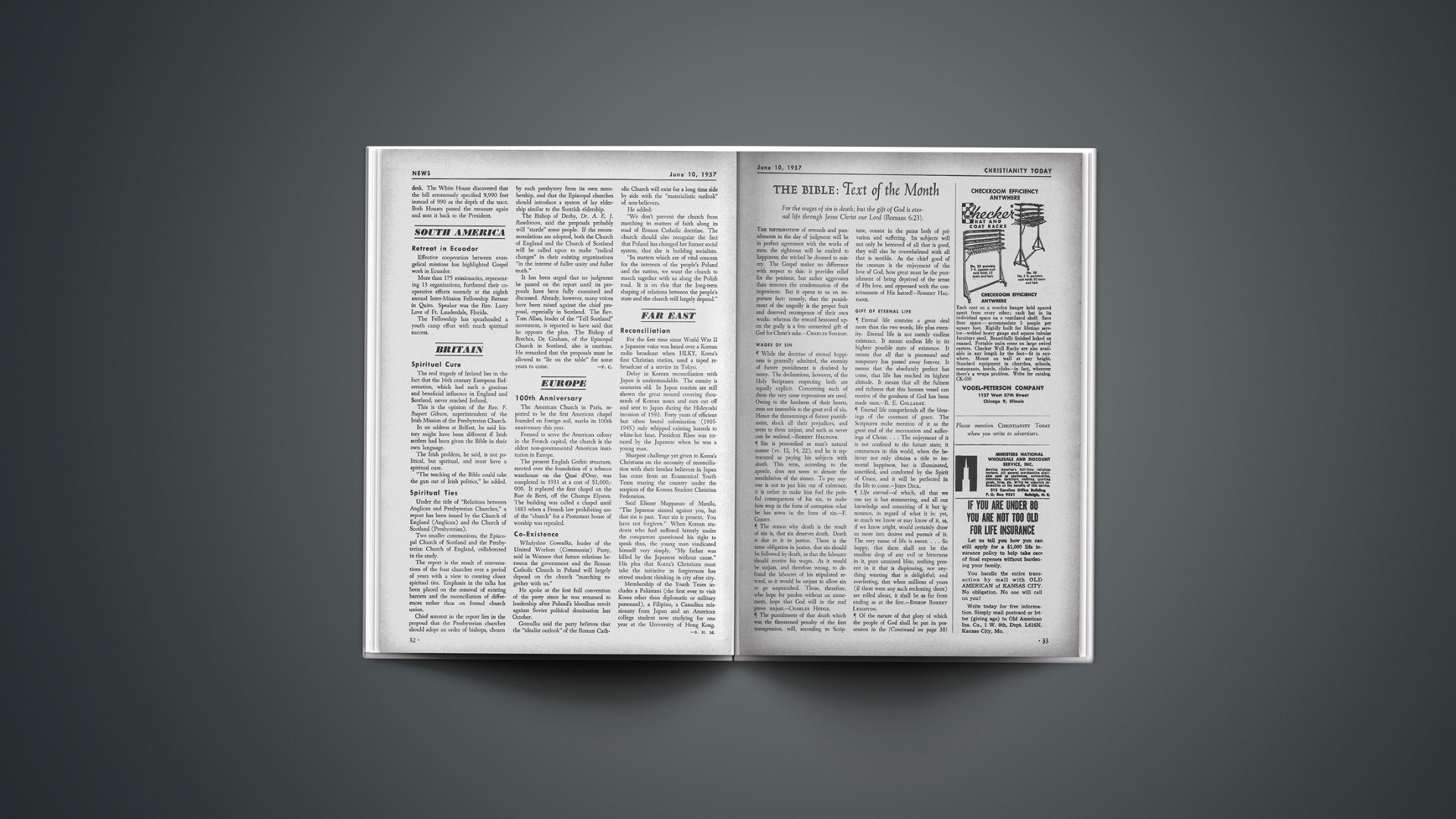The French drama is in effect a moral drama. But the meaning of the epithet reaches beyond the framework of frivolous morals, of which France no longer has the monopoly. It concerns a religious form of thought, of feeling, of action, and of reaction which determines the internal structure of the individual and which survives even when the individual has ceased to believe or to practice his beliefs.
A Nation’S Moral Shame
The moral revolt in France is largely written in contemporary life. Evidences may be found in the wide-spread religious indifferences and atheism, in social evils, in the increase of mental illness and in other aspects of the national life.
In a population of 43 million, according to the latest figures, there are, at most, less than 10 million “believers”—if that term dare be applied to the 9 million who are baptized in the Roman Catholic Church, and the 800,000 on Protestant church rolls. One fact is clear: three-fourths of the population, or 33 million persons, live on the fringe of the Christian churches.
Social evils are rife. Before 1914, there were 35,000 divorces annually; today the figure is 250,000, and some estimates lift it to 350,000. This is a direct consequence of religious indifference, for the home is no longer secure when divine law is unrecognized and when the church exercises no salutary influence upon it.
Alcoholism is a stigma upon the nation’s life. According to official statistics of the Minister of Finance, France has 450,000 liquor stores, or 10 to each baker shop—one for every 86 persons. In 1951 France produced about 1,276,000,000 gallons of wine, 484,000,000 gallons of cider, 176,000,000 gallons of beer. The average consumption annual per capita is high: for all adults 20 years and over, 34 litres; adult men, 54 litres; adult women, 18 litres. These figures far exceed the rest of Europe.
The causes of alcoholism in France are numerous, but three are especially prominent: the hovels, or poor housing conditions, with which inhabitants must often contend; nervous anxieties due to privation and suffering during the war and postwar years; and habit or custom. Public authorities have sought to improve housing, but the hovels are many. Liquor shops open to the working man divert and distract him from the burdens of insufficient income. Many alcoholics are nervously afflicted, resorting to alcohol to quiet their fears and to find a feeling of abundance. But most addicts are victims of education and custom: to drink is to evidence manliness. The masses believe that wine and alcohol are necessary for work and even for sanity.
In 1940 the population of psychiatric hospitals numbered 110,000. During the war legislation and lowered supplies of liquor brought a noticeable reduction in numbers. Since 1945 the increase of patients has resumed at an alarming rate: in 1954 the figures of 1939 were almost reached again. The increased number of liquor shops and their legal tolerance or approval are regarded as contributory factors.
Child delinquency is another sign of the decay of national life. There are more than 100,000 known delinquents. Most of the strayed youth have seen nothing but homes of quarreling, vice, violence and injustice; family life is deficient. Alongside the problem of environment is that of heredity; alcoholism, syphilis and tuberculosis are important factors.
Prostitution is a common vice, for which statistics cannot be easily obtained. In 1910 the Chief of Police estimated that 60,000 women in the Seine area alone lived more or less entirely by prostitution. The 1946 legislation, requiring registration, was exclusively for sanitary regulation, not for policing. The number of registered prostitutes in 1952 was 8,000; of these, 3,000 registered in Paris. These figures by no means tell the full story, for these are far outnumbered by a legion of clandestine offenders who escape control.
There are other evidences that the moral atmosphere vanishes, and law is bypassed, when spiritual checks no longer guard the national life. Pandering is a tragic phenomenon in the large cities, and is caused by traffic in dope. Bawdy literature, of the “Paris-Hollywood” type, is sold in a quantity of two million pieces monthly. Even sports have become an end in themselves, often serving as a pretext for indulgent eating and drinking after the game. Many old rugby players and boxers maintain tavern patronage in their associations with old comrades.
Origin And Causes Of Crisis
Because this writer sees in the religion to which the majority of the French people still adhere the fundamental explanation of the crisis France is passing through, he, though French by nationality, has agreed to write these lines. Other Frenchmen, better qualified than he in the sociological and political realms, have already analyzed the situation, as, for example, in the captivating book by Frederic Hoffett, Protestant Imperialism (Flammarion, 1948).
Romanism has pressed its mold on freethinkers as well as on believers. This invisible background alone can give a valid account of the actual behavior of the nation that was long called “the eldest Daughter of the Church.”
The crisis France is enduring commenced when she rejected the Reformation.
In other countries the “Protestant man” was prepared for liberty and thus for a natural adaptation to democracy; the “Roman Catholic man,” always submissive to the church’s direction, remained inadequately prepared for modern forms of political life. (Let us remember what Brunetiere said: “What I believe? Ask it of Rome.”) Hence the discipline of the Protestant, to which he freely consented (which explains the evolution and astonishing success of the Anglo-Saxon nations), contrasts with the revolt and complexities of the Roman Catholic man and with the germs of political instability and moral decline in the Roman Catholic nations.
Thus two factors of religious origin are at the basis of the decline of the French nation: persecution and the order of the Jesuits.
The opponents of French Protestantism admit themselves that the Reformation, at its beginnings, had conquered a quarter if not half of the kingdom. Neither the mind nor the French temperament was hostile to it. What arrested its salutary expansion, and what explains why French Protestantism today is a weak minority, is persecution. The latter was the work of the church. For under the cloak of a royal authority, frightened of liberty, one can discern the guidance of Roman inspiration. The history of three centuries of martyrdom and the heroism of epic Huguenot believers are the irrefutable proof of this fact. With consummate skill, the Roman church multiplied its efforts to win over the princes; she overcame their hesitations through seduction or through terror; she promised her support in the realization of their designs of despotism, and she held over them the threat of the mysterious and poisoned weapons of her occult authority. Thus the kings who, for a moment, had inclined toward the Reformation, finding in the latter no furthering for their tyrannical projects, nor for their vices and their passions, turned from the Reformation and became the executors of the church, implacable toward heresy, but smiling upon crowned corruption.
So it came about that fanatical popes, such as Paul III and Paul IV, depending on the intimate union between Church and State, managed to transform heresy into crime, and on those grounds were able to undertake the most serious measures against the Protestants. At their instigation, Francis I in 1542 proclaimed his intention to pursue heresy “until the foundation and the root of this pest should be exterminated and abolished,” and he ordered in the year 1544 “that one should proceed with all diligence to seize, chastise and punish those who propagate the Reformation.” In acting thus, the kings conformed to the will of the popes. Thus we find Pope Pius V writing to Charles IX at the time of the St. Bartholomew massacre: “Your Majesty must pursue the enemies of religion until extermination.” At his crowning, Louis XIII, who consecrated his reign to exterminating heresy, offered his crown and his sword to the Virgin, in so doing imitating the Spaniard Don Carlos who had placed his person and his army under the sovereign protection of Mary. “I will only reign if you reign,” said Louis XIII in calling on the Virgin.
Persecution exterminated with the Reformation every possibility of spiritual renewal, and at the same time political and social renewals, the latter revealing themselves strictly bound to the former.
But to open violence, a more baneful force was added, perhaps through the insidious work of moral and intellectual fragmentation of the French soul: the Jesuit power.
Havings made their entry as “timid foxes” to Paris University in the sixteenth century, the Jesuits came to “reigning there as furious lions” (the expression is from Etienne Pasquier, himself a professor of Paris University).
The Revocation of the Edict of Nantes, which was to deprive France of her most fruitful spiritual substance, was the work of the Jesuits before it became that of Louis XIV.
Xavier de Ricard wrote that in order to break the Huguenots, Jesuitism “had invented, noted, classified, co-ordinated all the proceedings, all the maneuvers, all the intrigues, all the learned wiles and all the skilful violences prepared in cold blood which by a slow and successive extenuation, culminated in radical and legal extermination …” (The Political Spirit of the Reformation, 1893, p. 4). One can but read again the immortal “Letters to a Provincial” by Blaise Pascal, which edify one singularly on the pernicious work of the Jesuits and their machiavellian maneuverings for the education of men and nations.
“Radical and legal extermination,” said Xavier de Ricard. Extermination of bodies when the temporal gives its consent. But in every way—extermination of will, of conscience, of righteous judgment—through the substitution of a soul simultaneously servile and given to low desires clever and brutal, deceitful and inconsistent.
Persecution and Jesuitism have been the educators of modern France.
The Present And The Future
France has known the Revolution of 1789. The latter culminated in the formation of new and generous principles. But the idealists who conceived them, if they changed the facade, were not able to regenerate the soul of the nation. For the Revolution was above all an explosion of hatred against the joint despotism of the king and the church.
The political and social upheavals which have agitated France since 1789 and which led her in turn from the Republic to the Empire, from the Empire to the two most recent Republican Constitutions, did but powerfully underline the moral uneasiness of a long clerical regime. Men may change but the spirit remains. To royal absolutism the bureaucratic dictatorship succeeds; the separation of the church from the State has given the French clergy a wider liberty of action. The priest is no longer the holder of civic and legal authority, but the church is always present in the private counsels of those in authority and in the official organisms through her individual commands. Her voice is not alien to the solutions of compromise, to the dilatory maneuvers which characterize French political laws or French diplomacy.
As to the Protestant fraction, it was easily carried away by the current. Worn out by centuries of suffering and clandestine existence, deluded by the tolerance engendered by the well-being and buoyancy of a new-found peace, it accepts many fatal compromises. It suffices to read the collection of sermons of the nineteenth century to understand the obsequiousness of the Protestant clergy, who with bewildering suppleness were able to praise in turn the imperial prestige and the benefits of the Restoration. Today, with the exception of a few centers authentically Calvinistic and biblical by tradition, the Protestant mass has well accommodated itself to the moral, political and social standard of the nation. Its leaders seem more inclined toward “Reformed clericalism” than toward a return to the principles of the Reformation. The nostalgia for church union has silenced all problems of doctrine.
One is amazed to see how much certain churches which pretend jealously to maintain Calvin’s conception remain bound to the sacramental practices of Rome. For fear of alienating a vast number of Protestants with Roman Catholic tendencies, their heads, though evangelical, disapprove of pastors who refuse to baptize indiscriminately the children of the faithful and the children of unbelievers. The synodal assemblies bring forward again and again the question of the sacraments. Concerning this question, an uneasiness weighs on these communities. One realizes that one day one should put an end to these practices of “baptisms” and of “confirmations” which are nothing more or less than Roman Catholic. But one does not dare to make a change. On the other hand, these same synodal assemblies integrate into the pastoral body with disconcerting ease and without previous tests former priests newly converted.
Persecution seems to have eliminated the true Huguenot substance of France, and Jesuit education seems to have weakened the conscience of the sons of Huguenots. The Jesuit order is the determinating factor in the political and social life and general behavior of the French people.
The constant changes of government, the social upheavals, the periodical scandals such as the Stavisky affair, under the Third Republic, the “leakages” affair under the Fourth Republic, can only be explained by the moral deviations of clerical education. In the same way, the reproaches addressed to the French—lack of seriousness in the handling of affairs, lack of civic spirit—must be attributed to this same education.
The success of the French communist party is above all imputable to clericalism. Our Anglo-Saxon friends, whose hysterical fear of Communism sometimes warps their perspective, should realize this fact. The Frenchman, barring some exceptional cases, is not Marxist. He is attached to his small property or to the small capital which is the fruit of his labor. Social laws in France are as advanced as in the most democratic of foreign countries. The economic standard is not below that of neighboring nations. Communism in France is chiefly anticlerical reaction. Its advance in the recent elections is chiefly owing to the collusion, more or less avowed, of the different republican parties with clericalism. This explains why the communist party, which in the National Assembly is the most numerous, in the nation itself plays but a fairly effaced role. Its opposition is always justified on philosophical grounds. It does not justify itself on the plane of social progress.
Hope For Renewal?
We believe there is hope for straightening out the situation in France, if past experiences are taken into account and if men act with courage and without delay, relying upon the elements of promise which are as yet uncontaminated.
The ill being essentially of a spiritual nature, the redress of France may be a spiritual redress.
The failure of the Reformation in the sixteenth century should not augur a new failure. The constitutional and social conditions of the nation are today totally different.
On the other hand, however marked the French people are by the pharisaical turn of mind, they show themselves more and more detached from Roman Catholic practices. The people are psychologically open to a spiritual renewal. Religious meetings, stripped of all ecclesiastical stamp, are generally well attended, and sects of diverse kinds attract followers more than ever. The churches have lost all credit with the masses, but the Bible, almost totally unknown, is favorably accepted.
Therefore we are convinced that the hour has come to launch into France missionary teams of evangelists and scholars whose task will be the conversion of souls and the study of the Word of God. This work must be carried out by the French, but with the indispensable cooperation of believers from abroad.
Those who believe in the power of a new life through the Bible and in regeneration through the blood of Christ, and who do not want France to perish but who desire her renewal, take an interest in the evangelization of the French, and make this the subject of their prayers.
END
On The Late Hungarian Massacre
The blood of our brothers cries out from the ground,
As Rachael our mother weeps over her slain,
Fallen at Kilian. Again we are bound;
And alone we tread out the winepress in pain.
In words, multitude, the nations now clamor,
Resolve, passing censure against the oppressor,
While thousands desert the dread sickle and hammer
At the frightful exposure. They seek a confessor.
But the foe, crafty, taunts us, “Men forget past events,
And your plea, ‘Come and help, lest you suffer our fate,’
Will be drowned in the din of new world ferment.”
Even now in our ranks some murmur, “Too late.”
Is it nothing to you, all you who pass by,
That a people, a nation, for freedom now die?
F. MARK DAVIS
Dr. André Lamorte served for 15 years as Dean of the Faculty and as Professor of Theology at Aix-en-Provence in France. More recently he has been active in “France Evangelisation,” a movement aggressively interested in Bible study and evangelism. He holds the Th.D. degree from Montpellier and in 1954 was named attache to the National Center of Scientific Research.

